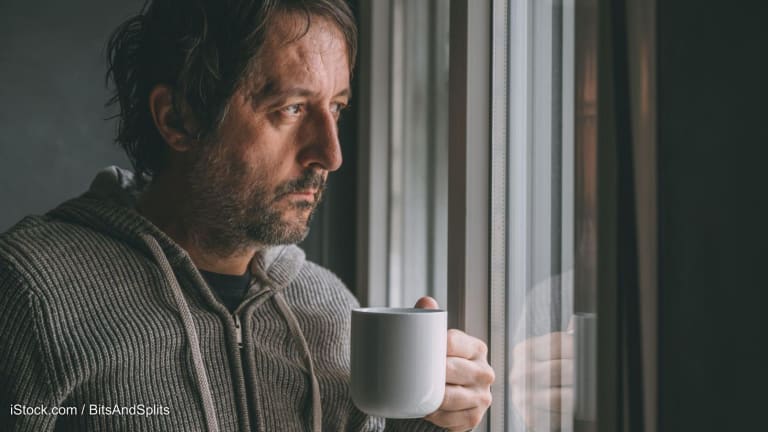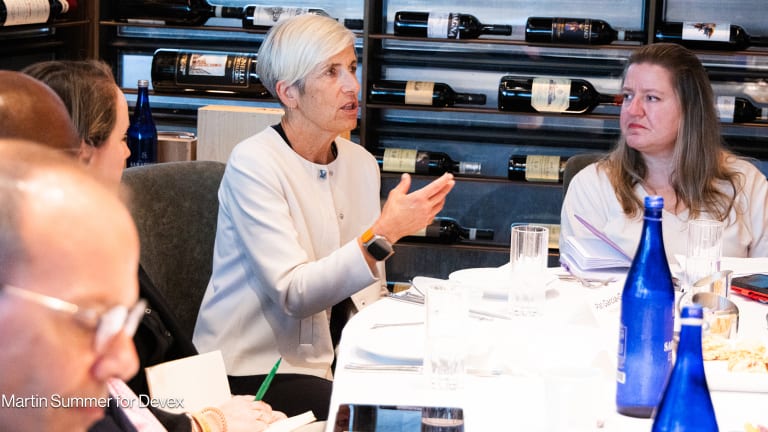Q&A: Should Ebola care be integrated into DRC's public health system?
Tristan Le Lonquer, an Ebola emergency coordinator with Médecins Sans Frontières, explains why they are setting up treatment zones within primary health care centers, and what the challenges are.
BARCELONA — Ebola response and treatment should be integrated into public health systems, says Tristan Le Lonquer, Ebola emergency coordinator in North Kivu, DRC, for Médecins Sans Frontières, which is part of the national task force coordinating the response to the outbreak. “I'm not saying we do it full-time and that it's an easy thing to do, but I think it's a way to build trust with the communities and bring back this specific disease into the spectrum of regular care,” he said. It would show the population that organizations and government care about the diseases they face on a daily basis as well as emergency outbreaks, he added. Last week, the World Health Organization announced that Ebola remains a public health emergency in the Democratic Republic of the Congo, which is struggling with a year-long outbreak that has so far killed more than 2,000 people. MSF has begun taking steps to integrate Ebola care by setting up transit centers within primary health centers where possible. Here, Ebola patients receive standardized medical care while blood samples are sent to the nearest laboratory for testing — a process that takes around 48 hours — allowing them to remain close to home. If the patient tests positive, they are referred to the closest treatment center. “It took time to explain and build trust. Community engagement is still the key for us.” --— Tristan Le Lonquer, DRC North Kivu Ebola emergency coordinator, MSF “It's a concept we've been working and deploying since April and that is used now by other nongovernmental organizations and also by the Ministry of Health,” said Le Lonquer. Speaking to Devex, he explained the challenges of integration and how to overcome them. This conversation has been edited for length and clarity. The work you're doing is focused on the belief that Ebola care should be integrated into the community health system. Why do you think that is and what steps are you taking to make that happen? As we learn more about the disease, the protocols, the way to treat the patient, the set-up around the care, as we improve and learn how to target and mitigate the risk, we’re also thinking that, step by step, there is a way to integrate the Ebola care into regular care. This is not an easy thing to do of course, but the transit centers that have been integrated into the primary health care facility are a first step. They show we can have biosecure isolation and a strong set-up inside a regular health facility. We also see that maybe in the near future we’ll be able to decentralize the treatment, providing treatment in isolation to avoid patients having to go away from their own homes or towns. This second pillar is moving a little bit slower because we also need to build the protocol and have the treatment available. How difficult is it to get the local communities and health systems onboard with this idea of integration and decentralized care? It’s basically the story of how to build trust in the community, how to explain this new disease, how to let the patient, family, everybody know that it's a serious and very deadly disease. When you have a new disease or outbreak in a community, that brings a lot of worry and concern and people are always seeking a rational explanation. In the beginning, it's hard to provide the community with rationale that explains why there is the disease. We know it's coming from wild animals, we know that most likely somebody has eaten an infected animal — probably bats — but we don't know exactly what the first chain of transmission was so it's hard to explain. And in the beginning, the disease itself was very violent and very intrusive. The response was very intrusive. It’s all about explaining why you need somebody to decontaminate a dead body, why it needs to be in a body bag, why the house needs to be decontaminated. All of that is very intrusive and hard to understand when you're mourning somebody and people are showing up in full personal protection equipment and doing chlorination of your house. It took time to explain and build trust. Community engagement is still the key for us. What are the other challenges you faced in terms of trying to integrate Ebola care into the health systems? The challenge is to build and maintain the biosecurity protocols around transit centers because you need to have a specific way to deal with the waste area and to deal with laundry, you need to dress in full personal protection equipment so you need to have a solid set-up. Build and maintain the isolation and biosecurity protocols, train the staff and have enough staff — that is something that requires a lot of support from the Ministry of Health. In the beginning, the main challenge was to show the medical community that we can integrate Ebola care. It's just adapting to another protocol, to another set-up maintaining the biosecurity. The medical community was reluctant to do that because they thought it would jeopardize the protocol and spread the disease. Training people, maintaining the quality of care, maintaining the level of implementation of the protocols — that's challenging but fruitful. I would say now that the Ministry of Health really sees the benefit and agrees on this dynamic of decentralization of care and transit center and isolation capacity. What would your advice be for governments or organizations who plan on adopting the same approach? I would say to reflect on the protocol and have a way to see how we can find the middle ground between biosecurity and acceptance. Try to bring the patient back into the loop so that it is humanized care. Think about a way to get closer to the patient. It means maybe protocol that is more detailed and adapted to the risk and level of contamination [of] the viral load.
BARCELONA — Ebola response and treatment should be integrated into public health systems, says Tristan Le Lonquer, Ebola emergency coordinator in North Kivu, DRC, for Médecins Sans Frontières, which is part of the national task force coordinating the response to the outbreak.
“I'm not saying we do it full-time and that it's an easy thing to do, but I think it's a way to build trust with the communities and bring back this specific disease into the spectrum of regular care,” he said. It would show the population that organizations and government care about the diseases they face on a daily basis as well as emergency outbreaks, he added.
Last week, the World Health Organization announced that Ebola remains a public health emergency in the Democratic Republic of the Congo, which is struggling with a year-long outbreak that has so far killed more than 2,000 people.
This story is forDevex Promembers
Unlock this story now with a 15-day free trial of Devex Pro.
With a Devex Pro subscription you'll get access to deeper analysis and exclusive insights from our reporters and analysts.
Start my free trialRequest a group subscription Printing articles to share with others is a breach of our terms and conditions and copyright policy. Please use the sharing options on the left side of the article. Devex Pro members may share up to 10 articles per month using the Pro share tool ( ).
Rebecca L. Root is a freelance reporter for Devex based in Bangkok. Previously senior associate & reporter, she produced news stories, video, and podcasts as well as partnership content. She has a background in finance, travel, and global development journalism and has written for a variety of publications while living and working in Bangkok, New York, London, and Barcelona.








